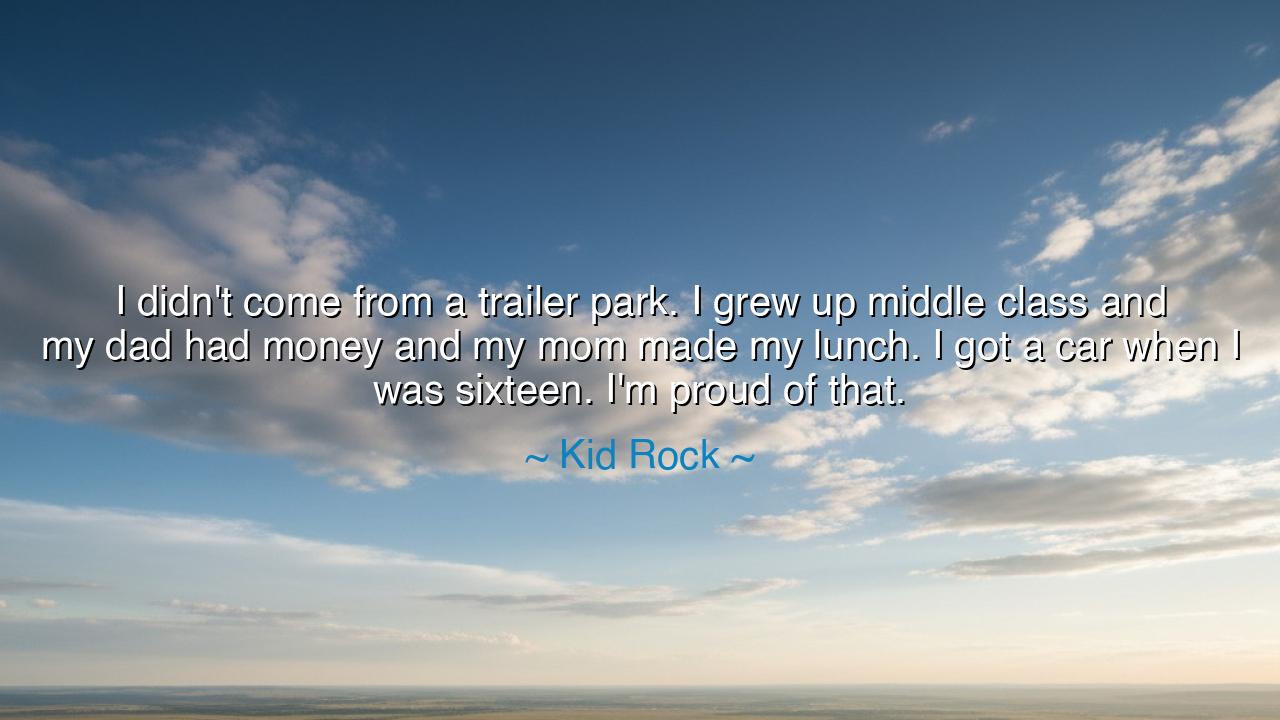
I didn't come from a trailer park. I grew up middle class and my
I didn't come from a trailer park. I grew up middle class and my dad had money and my mom made my lunch. I got a car when I was sixteen. I'm proud of that.






The words of Kid Rock—“I didn't come from a trailer park. I grew up middle class and my dad had money and my mom made my lunch. I got a car when I was sixteen. I'm proud of that.”—are, at first glance, a simple declaration of fact. Yet beneath their plainness lies a deeper current of meaning: a statement of authenticity, gratitude, and self-acceptance. In an age where many disguise their origins to fit a story, where people often hide their privilege or exaggerate their hardship to seem more “real,” these words are a defiant act of truth. Kid Rock, a man known for his rough-edged persona, rejects the illusion of struggle that some adopt for credibility. He stands instead in honesty—declaring that there is no shame in coming from comfort, that one’s worth lies not in where they began, but in what they became.
At its heart, this quote is a lesson about owning one’s story. In speaking openly of his middle-class upbringing, Kid Rock affirms that authenticity is more powerful than artifice. The ancient philosophers taught that integrity—alignment between one’s words and one’s truth—is the foundation of character. To pretend to be something you are not, whether poorer or richer, weaker or stronger, is to fracture the soul. The artist who builds his image on falsehood will eventually crumble under the weight of it. But the one who builds upon truth, however ordinary, stands firm like a house built on stone.
In the world of music and fame, where hardship often becomes the badge of honor and struggle the currency of legitimacy, Kid Rock’s statement becomes an act of rebellion. Many feel they must invent a past of poverty or chaos to seem authentic, believing that only pain can produce greatness. But the truth is simpler and older: greatness comes not from where you start, but from how fiercely you live, work, and love. The farmer’s son, the scholar’s daughter, the orphan, and the heir—all are tested not by their birth, but by their choices. Kid Rock’s pride in his background is not arrogance; it is freedom from shame.
Consider the example of Marcus Aurelius, the Roman emperor and philosopher. Born into privilege, he never denied his position, yet he also never allowed it to make him complacent. Instead, he used his fortune to seek wisdom, discipline, and virtue. He understood, as Kid Rock’s words suggest, that the true test of a person is not whether they have suffered, but whether they have honored what they have been given. Aurelius did not apologize for his wealth; he justified it through action, turning privilege into purpose. Likewise, Kid Rock honors his upbringing by creating, by working, and by being unapologetically himself.
The line “I’m proud of that” carries a quiet defiance. In it lies a resistance to the cultural tide that tells people to feel guilty for the gifts they’ve inherited. Pride here is not vanity—it is gratitude transformed into strength. It is saying: “I will not apologize for my roots, but I will honor them by working hard, by staying true, and by remembering where I came from.” Such pride is not destructive; it is stabilizing. It anchors a person against the false winds of comparison, against the temptation to reshape one’s story to please others.
There is a certain humility in the details of the quote as well: a mother making lunch, a father providing for his child, a car at sixteen. These are the small graces of an ordinary life, yet they are the foundations upon which extraordinary dreams are built. The ancients taught that gratitude for the simple things is the mark of wisdom. One who cannot appreciate the quiet blessings of youth cannot bear the weight of success. By naming these moments with affection, Kid Rock reminds us that the greatness of life often begins in the small and the familiar—within the walls of home, within the care of those who loved us first.
Let this then be the lesson passed down to future generations: be proud of your roots, whatever they are. Do not invent hardship to earn respect, nor hide comfort to seem humble. Every beginning, whether modest or blessed, contains the seed of potential. What matters is what you do with it. The wise are those who transform gratitude into creation, privilege into purpose, and truth into legacy. So speak your truth boldly, as Kid Rock did. Stand where you began, not with shame or pretense, but with pride—for to be honest about one’s origins is to build a life that needs no disguise. And in that honesty lies a strength that can neither be shaken by fame nor undone by time.






AAdministratorAdministrator
Welcome, honored guests. Please leave a comment, we will respond soon